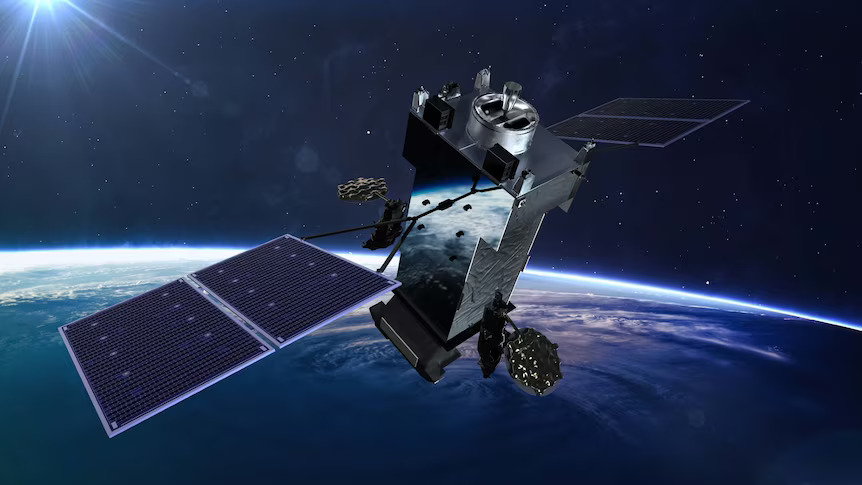“A Big Step Backward” For Australia! Canberra Cancels $7 Billion Military Satellite Project With Lockheed Martin

Australia has canceled a $7 billion military satellite project with US defense giant Lockheed Martin. The decision, communicated in a statement from the Department of Defence on November 4, will redirect efforts toward developing a multi-orbit satellite system.
Originally selected in April 2023, US defense contractor Lockheed Martin was poised to deliver a hardened network of three to five satellites to safeguard against cyber and electronic warfare threats.
Although formal contracts had not yet been finalized, Lockheed Martin secured the deal after outperforming rival bids from Airbus, Northrop Grumman, and Optus. This contract, which would have represented Australia’s largest-ever defense space initiative, was intended to establish the country’s first sovereign-controlled satellite communication system over the strategically vital Indo-Pacific region.
However, the Department of Defence determined that the project, known as JP9102, no longer aligned with Australia’s “strategic priorities.”
In its statement, the Department acknowledged the rapid advancement of space technologies and the emergence of new threats, concluding that a single-orbit geostationary (GEO) satellite communications system would be inadequate to address these challenges.
Instead, the focus will shift to a multi-orbit capability, which promises greater operational flexibility and resilience.
Prime Minister Anthony Albanese, speaking on the Australian Broadcasting Corporation ahead of the announcement, reiterated that while the defense budget is rising, the government remains committed to prioritizing its procurement strategies.
Moreover, the Defence Department confirmed its intention to allocate between A$9-12 billion (approximately $13.87 billion) to develop enhanced space capabilities.
The Department of Defence emphasized that existing satellite communication systems meet the immediate operational needs, allowing the organization to pivot towards addressing emerging challenges and capability gaps.
AfriPrime App link: FREE to download...
This strategic redirection aims to foster an integrated and focused defense force that can effectively respond to the complexities of modern security threats.
A Major Setback For Australia’s Space Capabilities?
Dr. Malcolm Davis, a Senior Analyst at the Australian Strategic Policy Institute, criticized the decision to cancel the JP9102 project as “a big step backward” for Australia’s future in space.
He noted that this decision follows the government’s previous move to terminate the National Space Mission for Earth Observation (NSMEO) last year as part of budgetary adjustments.
Davis argued that the current government is not providing the necessary support for Australia’s space sector, resulting in a reversal of progress toward establishing a sovereign space capability.
He went on to describe the cancellation of JP9102 as a “staggeringly stupid” decision that could harm the nation’s credibility.
He underscored the essential role of secure communications in military operations: “Without comms, you are not in the fight — Australia can’t have a sovereign defense force without sovereign satellite communications.”
The JP9102 satellite system was envisioned to establish an ultra-secure data network for the Australian Defence Force (ADF), creating a robust layer of communication protection across its operations.

Built to military-grade standards, these satellites aimed to safeguard communications for Australia’s military assets over the expansive Indo-Pacific region. This would ensure resilience against potential cyber and electronic threats.
The initiative involved launching multiple large military-grade satellites and establishing various ground stations, new satellite communications operations centers, and a centralized management system.
Currently, the existing system lacks the comprehensive security and coverage that the JP9102 project promised. As a result, Australia’s military communications could be susceptible to cyber and electronic warfare threats.
In 2023, Defence Minister Richard Marles also expressed the government’s confidence in maintaining a presence in space, particularly in light of reports indicating that hundreds of Chinese satellites had been deployed over Australia to monitor military exercises.
Moreover, JP9102 was recognized as a “bleeding-edge technology project” that incorporates plans for machine learning capabilities to enhance agility and responsiveness. The Australian Strategic Policy Institute also pointed out the project’s potential for facilitating future technological advancements.
“The JP9102 satellites may, if they are based on open-architecture design or software-based systems, take advantage of future on-orbit servicing technologies that could extend their operational life and enhance their capabilities over time,” according to the ASPI.

Budget Constraints Lead To Project Cancellation
Shadow Defence Minister Andrew Hastie strongly condemned the Albanese government’s decision to cancel the JP9102 project, calling it “disgraceful.”
Hastie criticized the government for abandoning the initiative just 18 months after its launch, claiming the cancellation would undermine Australia’s capabilities in strategic intelligence and future force coordination.
According to Hastie, the project’s abrupt end is mainly due to a lack of funding in the current defense budget.
While Hastie’s critique was firm, some figures in the defense industry privately suggested that the government might be justified in exploring more cost-effective and practical alternatives.
A defense source familiar with the ongoing deliberations explained to the ABC that, due to budget constraints, the Department of Defence was forced to make deep cuts rather than incremental reductions to existing contracts.
Additionally, some experts believe more affordable alternatives are available, such as leveraging Australian space assets by integrating them with existing satellites operated by US companies.
This approach could potentially mitigate some of the funding issues while still enhancing Australia’s military capabilities.
The overarching theme emerging from this situation is the widening gap between Australia’s defense aspirations and fiscal limitations.
As regional tensions escalate and cyber threats become increasingly sophisticated, the decision to cancel JP9102 highlights the difficult choices that must be made between securing Australia’s military communications and managing costs.
AfriPrime App link: FREE to download...
- Questions and Answers
- Opinion
- Story/Motivational/Inspiring
- Technology
- Art
- Causes
- Crafts
- Dance
- Drinks
- Film/Movie
- Fitness
- Food
- Jeux
- Gardening
- Health
- Domicile
- Literature
- Music
- Networking
- Autre
- Party
- Religion
- Shopping
- Sports
- Theater
- Wellness
- News
- Culture
- War machines and policy

